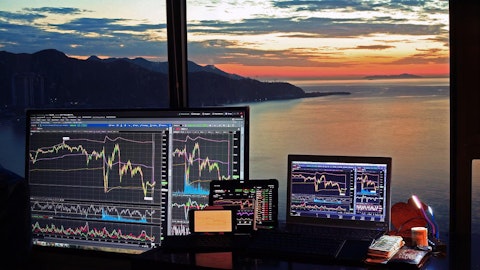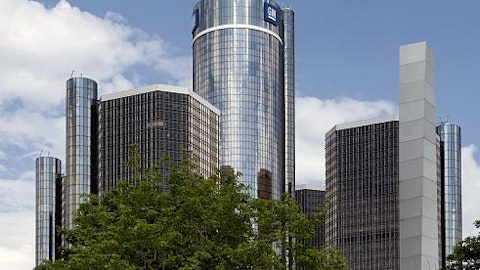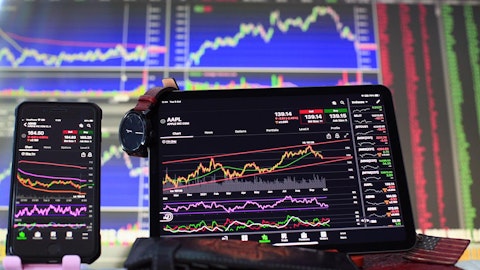In this article, we discuss 5 long-term stocks to buy and hold according to Warren Buffett. If you want to see more stocks in this selection, check out 10 Long-Term Stocks to Buy and Hold According to Warren Buffett.
5. The Procter & Gamble Company (NYSE:PG)
Number of Hedge Fund Holders: 71
Berkshire’s Holding Period: 10 Years
The Procter & Gamble Company (NYSE:PG) is an American multinational company that sells branded consumer packaged goods worldwide. The Berkshire portfolio had 315,400 shares of The Procter & Gamble Company (NYSE:PG) in the second quarter of 2022, worth $45.3 million. The hedge fund has maintained a position in the company since the first quarter of 2013. On July 29, The Procter & Gamble Company (NYSE:PG) reported earnings for Q2 2022, posting an EPS of $1.21, missing Wall Street consensus by $0.02. The revenue of $19.52 billion outperformed estimates by $104.13 million.
Barclays analyst Lauren Lieberman on August 2 reiterated an Overweight rating on The Procter & Gamble Company (NYSE:PG) and lowered the price target on the shares to $154 from $157 after the Q2 results. The analyst thinks that The Procter & Gamble Company (NYSE:PG)’s business model needs to be more defensive this economic cycle for share price outperformance.
Among the hedge funds tracked by Insider Monkey, 71 funds were bullish on The Procter & Gamble Company (NYSE:PG) at the end of Q2 2022, compared to 72 funds in the previous quarter. Ray Dalio’s Bridgewater Associates is the biggest stakeholder of the company, with 6.7 million shares worth more than $970 million.
4. General Motors Company (NYSE:GM)
Number of Hedge Fund Holders: 75
Berkshire’s Holding Period: 11 Years
General Motors Company (NYSE:GM) is a Michigan-based multinational automotive firm. Warren Buffett has been a long-term General Motors Company (NYSE:GM) bull, and he has maintained his stake in the firm since the first quarter of 2012. In Q2 2022, the billionaire owned approximately 53 million General Motors Company (NYSE:GM) shares, worth $1.67 billion, representing 0.55% of the total 13F portfolio. The company on August 19 reinstated its quarterly dividend of $0.09 per share, and raised share repurchase capacity to $5 billion. The dividend is payable on September 15, to shareholders of record as of August 31.
Wedbush analyst Daniel Ives on July 27 reaffirmed an Outperform rating on General Motors Company (NYSE:GM) and lowered the price target on the stock to $42 from $50. The analyst observed that General Motors Company (NYSE:GM) reported Q2 results which were plagued by several supply chain issues, which he views as a strong short-term headwind for the company. However, the analyst believes General Motors Company (NYSE:GM) has a robust EV vision for the next decade, and the company is planning to invest $35 billion in EV/AV product development to transition into an all-EV strategy by the end of the decade. General Motors Company (NYSE:GM) also reiterated its guidance for the full-year 2022, with solid assumptions for the second half of the year, the analyst told investors.
According to Insider Monkey’s data, 75 hedge funds were bullish on General Motors Company (NYSE:GM) at the conclusion of June 2022, compared to 76 funds in the previous quarter. Harris Associates is one of the largest stakeholders of the company, with 43.6 million shares worth $1.38 billion.
Here is what Oakmark Global Fund has to say about General Motors Company (NYSE:GM) in its Q1 2022 investor letter:
“General Motors (NYSE:GM) was a detractor during the quarter, due to increased macro uncertainty, higher fuel prices, and concerns over rising input costs, which pressured the company in particular and the auto industry as a whole. While we are closely monitoring the potential impact of these dynamics, industry demand remains robust, driven by strong consumer balance sheets and pent-up demand after multiple years of constrained production. We also remain confident in GM’s ability to navigate a complex operating environment, which the company has consistently demonstrated over the past few years. Finally, the long-term picture remains bright. We believe GM is significantly undervalued, is well-positioned for the long-term transition to electric vehicles and has numerous needle-moving ancillary business opportunities (most notably Cruise, which is an industry leader in autonomous vehicle technology) that are under-appreciated.”
3. Johnson & Johnson (NYSE:JNJ)
Number of Hedge Fund Holders: 83
Berkshire’s Holding Period: 12 Years
Johnson & Johnson (NYSE:JNJ) is an American multinational healthcare firm. Warren Buffett’s Berkshire Hathaway has been a long-term shareholder of Johnson & Johnson (NYSE:JNJ), with the stock featuring on the portfolio since Q4 2010. In Q2 2022, Buffett’s fund owned 327,100 shares of the company worth $58 million. On August 19, Johnson & Johnson (NYSE:JNJ) declared a $1.13 per share quarterly dividend, payable on September 5 to shareholders of record on August 23. The company is a reliable dividend king, with 58 years of consistent dividend growth under its belt.
On July 21, UBS analyst Kevin Caliendo assigned a Neutral rating to Johnson & Johnson (NYSE:JNJ) and lowered the price target on the stock to $180 from $185. The company’s Q2 results confirmed the macro undercurrents, which include the significant currency movement, high inflation, and slow elective procedure recovery, the analyst told investors in a research note. He added that China will potentially impact MedTech, but at 5% of Johnson & Johnson (NYSE:JNJ)’s sales, the risk seems “largely contained”.
Rajiv Jain’s GQG Partners is the biggest stakeholder of Johnson & Johnson (NYSE:JNJ) as of Q2 2022, with 6.5 million shares worth $1.16 billion. Overall, 83 hedge funds were bullish on Johnson & Johnson (NYSE:JNJ) in the June quarter.
Here is what Mayar Capital has to say about Johnson & Johnson (NYSE:JNJ) in its Q2 2022 investor letter:
“J&J is currently our largest position and a long-standing holding. The majority of the group’s sales comes from its collection of pharmaceutical franchises, but a large majority (~45%) comes from its collection of medical device businesses and its consumer brands.
Here’s how JNJ makes and spends a dollar of revenues: As of 2021, about 55 cents of that dollar comes from its pharmaceutical sales – sales of drugs to pharmacies and distributors – while 30 cents come from the sale of medical devices, such as surgery equipment and orthopaedics. The rest of that dollar in sales comes from sales of JNJ’s consumer brands such as Listerine mouthwash, Nicorette nicotine tablets and Neutrogena cosmetics.
To make that dollar, however, JNJ typically spends about 25 cents to make the products themselves and another 27 cents on marketing and general administrative functions. This leaves JNJ with about 48 cents on the dollar in profit…” (Click here to see the full text)
2. Mastercard Incorporated (NYSE:MA)
Number of Hedge Fund Holders: 137
Berkshire’s Holding Period: 12 Years
Berkshire Hathaway has owned a Mastercard Incorporated (NYSE:MA) stake since the first quarter of 2011. In the second quarter of 2022, the hedge fund held about 4 million shares of Mastercard Incorporated (NYSE:MA), worth $1.25 billion, representing 0.41% of the total 13F securities. On July 28, the company reported its Q2 results, posting earnings per share of $2.56 and a revenue of $5.50 billion, topping market estimates by $0.20 and $236.62 million, respectively.
On August 16, Daiwa analyst Kazuya Nishimura downgraded Mastercard Incorporated (NYSE:MA) to Neutral from Outperform with a price target of $375, down from $385. With border restrictions largely lifted, he sees lower scope for earnings to outperform market expectations, the analyst told investors. He also sees a “potential dearth of positive catalysts over the near term,” but added that Mastercard Incorporated (NYSE:MA)’s medium to long-term growth prospects are “healthy” and the company is strongly positioned to get returns from investments in the travel sector.
According to Insider Monkey’s data, 137 hedge funds reported owning stakes in Mastercard Incorporated (NYSE:MA) at the end of June, compared to 136 funds in the last quarter. Charles Akre’s Akre Capital Management is the leading stakeholder of the company, with 5.86 million shares worth $1.8 billion.
Here is what Mayar Capital has to say about Mastercard Incorporated (NYSE:MA) in its Q2 2022 investor letter:
“Visa and Mastercard have both been beneficiaries of the move away from cash over the course of the pandemic with the consequence that forward- looking opportunities for further penetration of card payments are lower than a couple of years ago. Moreover, cross-border payments – which were badly impacted by lockdowns – strongly recovered in 2021 and for both businesses are at or near to pre-COVID levels.”
1. Visa Inc. (NYSE:V)
Number of Hedge Fund Holders: 166
Berkshire’s Holding Period: 11 Years
Visa Inc. (NYSE:V) has been part of the Berkshire portfolio since the third quarter of 2011. In Q2 2022, Berkshire Hathaway owned about 8.3 million Visa Inc. (NYSE:V) shares, worth $1.6 billion, representing 0.54% of the total 13F securities. It is one of the most notable long-term stocks to buy and hold according to Warren Buffett.
On August 16, Daiwa analyst Kazuya Nishimura downgraded Visa Inc. (NYSE:V) to Neutral from Outperform with a price target of $225, down from $230. While Visa Inc. (NYSE:V) continues to deliver an upbeat growth outlook amid a recovery in cross-border travel, the analyst sees less scope for earnings to exceed market forecasts. However, he still rates the firm’s growth prospects in the medium to long-term highly.
Among the hedge funds tracked by Insider Monkey, Chris Hohn’s TCI Fund Management is the leading position holder in Visa Inc. (NYSE:V), with almost 20 million shares worth around $4 billion. Overall, Visa Inc. (NYSE:V) was found in 166 hedge fund portfolios at the end of Q2 2022, compared to 159 funds in the prior quarter.
Here is what Polen Global Growth Fund has to say about Visa Inc. (NYSE:V) in its Q1 2022 investor letter:
“We added to both Visa and Mastercard during the final quarters of 2021, based on the belief that both businesses were trading at attractive prices and poised to deliver, double-digit returns over the next three to five years. Cross-border transactions–a highly profitable business segment for both companies–represent roughly 10% of Visa and Mastercard’s volumes and 25% of their gross revenues, so lockdowns have severely impacted this segment due to stifled travel. While it was impossible to know when people would begin traveling again, we accepted this reality with the belief that travel would eventually return. Both companies have commented that as soon as a country or geography reopens, cross-border volumes reignite, amplifying each business’s growth and profitability. We think these near- term headwinds have created an attractive long-term investment opportunity.”
You can also take a look at Top Ten Semiconductor ETFs to Buy in 2022 and 8 Restaurant Stocks to Avoid as Americans Begin to Cut Spending.




